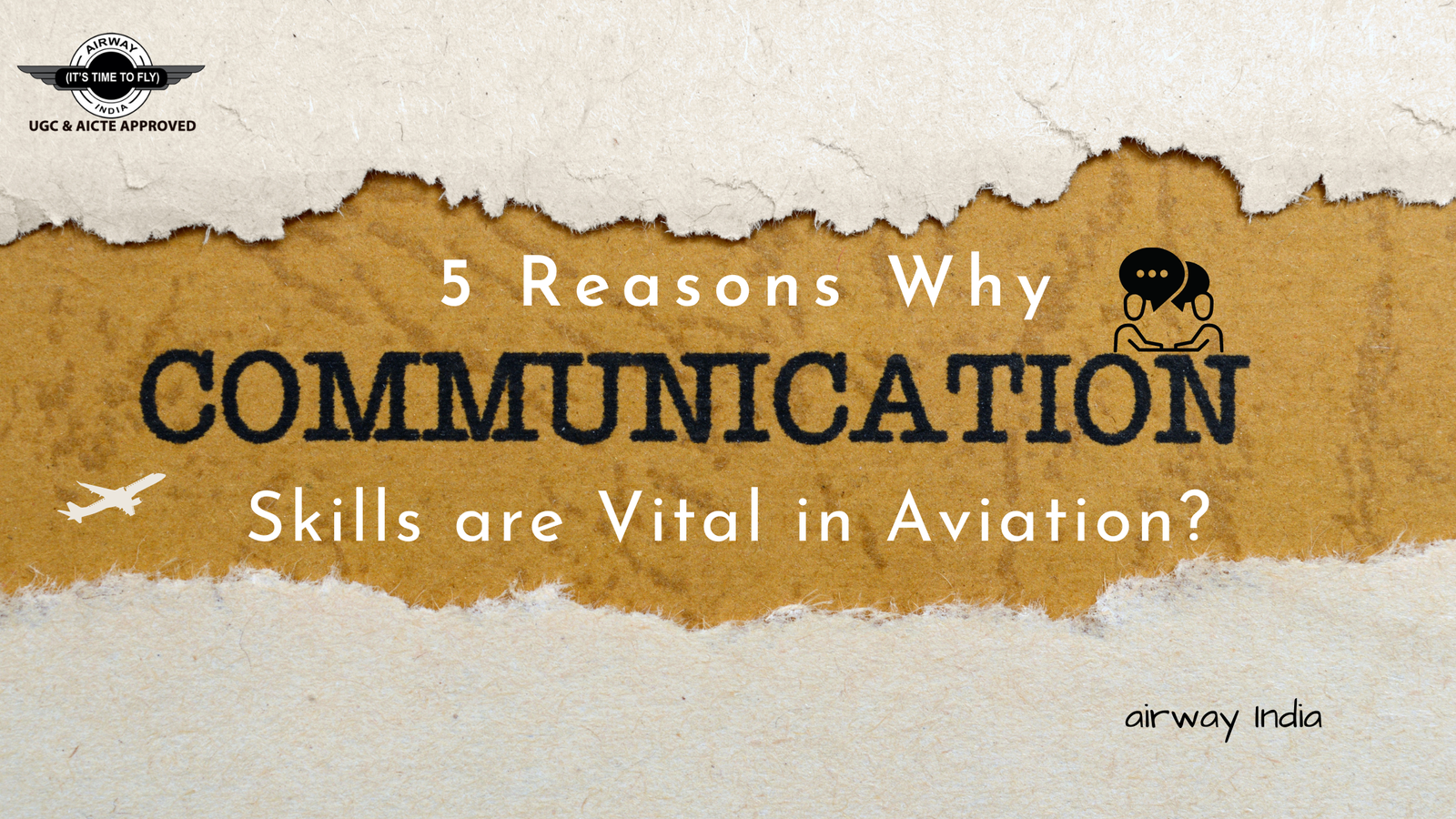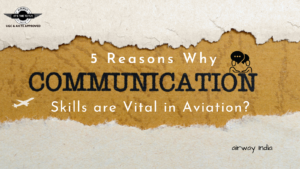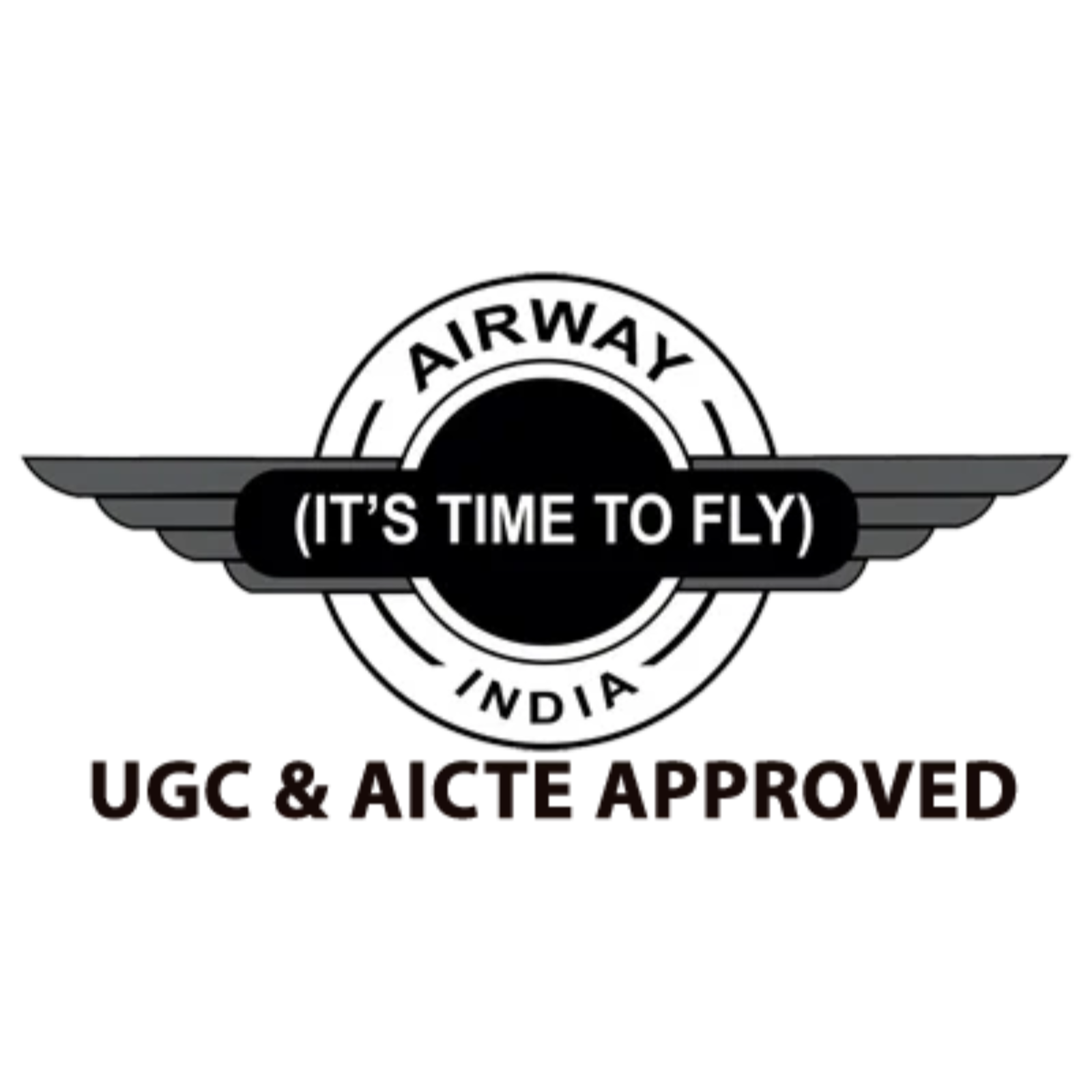
Breaking Barriers, Ensuring Safety: Embracing Communication Skills in Aviation World
Communication is a vital aspect of any industry, and the aviation sector is no exception. In this article, we will explore the importance of Communication Skills in Aviation and how they contribute to the safe and efficient operation of aircraft. Effective communication plays a crucial role in ensuring the seamless flow of information between pilots, air traffic controllers, ground personnel, and other members of the aviation team. Let’s dive into the significance of Communication Skills in Aviation and discover the key factors that contribute to their success.
Definition of Communication Skills in Aviation
Communication skills stand as a cornerstone within aviation, playing a pivotal role in ensuring secure and seamless operations within this intricate and fast-paced realm. In this industry where even the slightest misjudgment can bear severe consequences, the significance of proficient communication cannot be overstated.
Communication skills within aviation span a gamut of verbal, nonverbal, and scripted exchanges amid pilots, air traffic controllers, ground personnel, and the flight crew. The ability to articulate information clearly and succinctly serves as a linchpin in conveying pivotal details like flight routes, weather intricacies, and contingency protocols. The capacity to precisely relay information while adeptly acclimatizing to swiftly transforming circumstances stands as a non-negotiable aspect, pivotal in forestalling any misinterpretations or untoward incidents.
In the realm of aviation, well-refined communication skills expedite harmonious collaboration, foster situational cognizance, and champion the utmost echelons of safety.
Importance of Communication Skills in Aviation
In the fast-paced world of aviation, communication is critical. Learn why these skills are important for a smooth flight. Effective communication is paramount in aviation due to the following reasons:
I. Enhancing Safety and Operational Efficiency
In the fast-paced and high-stakes environment of aviation, clear and efficient communication is critical to maintaining safety and operational efficiency:
- Pilots rely on effective communication with air traffic controllers to receive instructions, navigate through airspace, and ensure collision avoidance.
- Ground personnel and flight crews must collaborate seamlessly through radio communications, conveying critical information for successful taxiing, takeoff, and landing operations.
- Accurate and concise communication prevents misunderstandings, reduces the risk of errors, and enhances overall safety measures.
II. Collaborative Decision-Making
Aviation professionals operate in a complex ecosystem where collaborative decision-making is essential for optimal outcomes:
- Effective communication allows for information sharing and consensus building among pilots, air traffic controllers, and maintenance personnel.
- Collaborative decision-making facilitates real-time problem-solving, enabling aviation professionals to address unforeseen challenges and make informed choices.
- Transparent and open communication channels foster a culture of trust, empowering team members to voice concerns, provide feedback, and collectively improve decision-making processes.

III. Crisis Management and Emergency Situations
In times of crisis or emergencies, strong communication skills become paramount to ensure swift and coordinated actions
- Aviation professionals must communicate with clarity and composure, relaying critical information during situations such as engine failures, severe weather events, or medical emergencies.
- Effective communication enables rapid response, quick decision-making, and coordinated efforts to mitigate risks and safeguard lives.
- The ability to relay instructions, delegate responsibilities, and maintain calmness under pressure can make a significant difference in the successful resolution of emergency situations.
IV. Cultural Sensitivity and International Collaboration
The aviation industry transcends borders, bringing together professionals from diverse cultural backgrounds. To foster collaboration and avoid misunderstandings, communication skills should encompass cultural sensitivity:
- Aviation professionals must be attentive to cultural nuances, adapting communication styles and approaches to effectively interact with individuals from different backgrounds.
- Embracing cultural diversity enhances cooperation, understanding, and respect among aviation professionals, contributing to harmonious teamwork and smoother operations.
- The ability to bridge cultural gaps through effective communication ensures seamless collaboration across borders and helps build stronger international partnerships.
V. Customer Service and Passenger Satisfaction
In the aviation industry, exceptional customer service is vital for maintaining positive passenger experiences:
- Strong communication skills enable flight attendants and customer service representatives to engage with passengers, address their needs, and provide a personalized and pleasant journey.
- Active listening, empathetic responses, and clear communication create a welcoming environment, enhancing passenger satisfaction and loyalty.
- The ability to handle challenging situations with professionalism, resolve conflicts, and effectively communicate safety instructions contributes to an overall positive travel experience.
Key Communication Skills in Aviation
To excel in communication within the aviation industry, professionals must develop and hone specific skills. Here are the key communication skills that are vital in aviation:
Verbal Communication Skills
- Clear and concise speech
- Use of standardized aviation phraseology
- Confidence in delivering instructions
- Effective questioning and clarification techniques
Nonverbal Communication Skills
- Body language awareness
- Eye contact and facial expressions
- Gestures and hand signals
- Understanding cultural differences in nonverbal cues
Listening Skills
- Active listening
- Paraphrasing and summarizing
- Avoiding interruptions
- Seeking clarification when necessary

Enhancing Communication Skills in Aviation
To improve Communication Skills in Aviation, several strategies can be employed:
- Training and Education: Comprehensive training programs that focus on effective communication techniques, including simulations and role-playing exercises, can enhance communication skills among aviation professionals.
- Practice and Simulation: Regular practice sessions and flight simulations provide opportunities for individuals to apply communication skills in realistic scenarios, allowing them to develop confidence and proficiency.
- Teamwork and Collaboration: Encouraging teamwork and collaboration within the aviation industry promotes effective communication. Team-building exercises and open communication channels contribute to a harmonious and efficient working environment.
How to Enhance Communication Skills in Aviation?
Ways to Enhance Communication Skills in Aviation.
Developing strong communication skills is an ongoing process that requires dedication and practice. Here are some effective strategies and techniques to enhance communication skills in aviation
-
Active Listening Skills
Listening is an essential component of effective communication. Actively listening to instructions, messages, or information from colleagues, air traffic control, or passengers improves understanding and minimizes the chances of miscommunication. To enhance active listening skills
- Maintain eye contact with the speaker.
- Avoid interrupting or formulating responses prematurely.
- Ask clarifying questions to ensure comprehension.
- Paraphrase or summarize important points to confirm understanding.
-
Practice Clear and Concise Communication
Clear and concise communication ensures that messages are accurately understood by the recipient. In aviation, where time is critical, conveying information succinctly and precisely is essential. Some tips for practicing clear and concise communication include
- Organize thoughts before speaking or writing.
- Use specific terminology and avoid jargon or abbreviations that may cause confusion.
- Focus on the key message and eliminate unnecessary details.
- Seek feedback to ensure the message has been clearly understood.
-
Enhance Non-Verbal Communication
Non-verbal cues such as body language, facial expressions, and gestures play a significant role in conveying messages effectively. To enhance non-verbal communication skills
- Maintain an open and approachable posture.
- Use appropriate hand gestures to emphasize or clarify information.
- Pay attention to facial expressions to reflect empathy, understanding, or urgency.
- Adapt non-verbal cues to cultural and contextual norms.
-
Develop Assertiveness
Assertiveness allows aviation professionals to express themselves confidently, ensuring their messages are received and understood. It helps in conveying concerns, suggestions, or instructions without aggression or passivity. To develop assertiveness:
- Use “I” statements to express thoughts and feelings clearly.
- Practice expressing opinions or concerns in a constructive and respectful manner.
- Learn to say “no” when necessary while providing alternatives or explanations.
- Seek assertiveness training or workshops to enhance communication style.
-
Effective Team Communication
Aviation is a team-oriented industry, and effective team communication is vital for seamless operations. Here are some strategies to improve team communication:
- Establish clear roles and responsibilities within the team.
- Foster an environment that encourages open and transparent communication.
- Use collaborative tools and technology for sharing information and updates.
- Conduct regular team meetings or briefings to address concerns and exchange feedback.
-
Cultural Sensitivity and Diversity Awareness
Aviation professionals often interact with individuals from diverse backgrounds and cultures. Being culturally sensitive and aware fosters respectful and inclusive communication. To enhance cultural sensitivity:
- Educate oneself about different cultures, customs, and practices.
- Be mindful of potential language barriers and adapt communication accordingly.
- Respect cultural differences and avoid stereotypes or biases.
- Seek guidance from colleagues or experts to better understand cultural nuances.
Benefits of Effective Communication Skills in Aviation
Effective Communication Skills in Aviation yield numerous benefits, including:
- Reduced risks of misunderstandings and errors
- Increased situational awareness
- Enhanced operational efficiency and on-time performance
- Improved crew coordination and cooperation
- Greater passenger satisfaction and comfort
Mastering communication skills in aviation is the ultimate flight plan for success. Ready to takeoff?
Reserve your seat
Challenges and Solutions in Communication
Despite the importance of Communication Skills in Aviation, several challenges may arise. Here are some common challenges and potential solutions
Language Barriers
-
- Multicultural aviation environments pose a significant challenge due to language differences.
- Solution: Encourage language proficiency by providing language training programs tailored to aviation terminology. Emphasize English proficiency as the lingua franca of aviation and promote standardized phraseology to minimize language barriers.
Noise and Distractions
-
- The noisy environment within an aircraft cockpit or a bustling air traffic control tower can hinder clear communication.
- Solution: Implement advanced communication technologies like noise-canceling headsets and clear communication protocols that emphasize the use of concise, standardized phraseology. Enhance situational awareness to mitigate distractions.
Time Constraints and Pressure
-
- Aviation professionals often face time constraints and high-pressure situations that demand quick and accurate communication.
- Solution: Incorporate realistic training scenarios that simulate time-sensitive situations. Provide stress management and decision-making training to help individuals communicate effectively under pressure.
Hierarchical Structures
-
- The hierarchical nature of aviation organizations can create barriers to open communication, particularly between different levels of personnel.
- Solution: Foster a culture of open communication by encouraging feedback, promoting cross-team collaboration, and establishing communication channels that facilitate dialogue across hierarchies.
Technology and Automation
-
- The increasing reliance on advanced technology and automation systems introduces new communication challenges.
- Solution: Provide comprehensive training on communication interfaces and protocols associated with new technologies. Emphasize the importance of effective human-machine communication and situational awareness.
By proactively addressing these challenges through targeted solutions, the aviation industry can enhance communication effectiveness, ensuring seamless operations, enhanced safety measures, and improved teamwork. The continual development of communication skills, combined with comprehensive training and supportive organizational culture, strengthens the industry’s ability to overcome communication challenges and thrive in an ever-evolving aviation landscape.
In conclusion, the importance of Communication Skills in Aviation cannot be overstated. These skills are essential for maintaining safety, efficiency, and collaboration within the aviation industry. By developing strong communication skills, aviation professionals can enhance their ability to convey information accurately, listen actively, and work seamlessly with their team members. Investing in communication training and fostering a culture of effective communication will contribute to a successful and thriving aviation environment.
Hopefully, the above discussion about the Importance of Communication Skills in Aviation will help you when you are concerned about it. Get more information then touch with us.
So, if you’re searching for a Best Airhostess Management College in Kolkata or BBA Aviation Management College in Kolkata, then you’re the right place, because Airway India is the Leading Airhostess Management College in Kolkata.
Fly like a pro. Start your aviation training
FAQs
Q. Why are communication skills crucial for pilots?
Effective communication is crucial for pilots as it ensures clear understanding of instructions, enhances situational awareness, and promotes safe and efficient operations.
Q. What are some recommended communication training programs for aviation professionals?
Several organizations offer communication training programs tailored for aviation professionals, such as ICAO’s Aviation English programs and CRM (Crew Resource Management) courses.
Q. How can aviation personnel improve their listening skills?
Aviation personnel can improve their listening skills by actively engaging in training programs, practicing active listening techniques, and seeking feedback from colleagues.
Q. What role does effective communication play during emergencies?
During emergencies, effective communication is vital for conveying critical information, coordinating emergency procedures, and ensuring a swift response to protect lives and assets.
Q. How can aviation organizations overcome language barriers?
Aviation organizations can overcome language barriers by providing language proficiency training, utilizing interpretation services, and encouraging a multicultural and inclusive work environment.
Q. How does effective communication contribute to customer service in aviation?
Clear and polite communication with passengers enhances their experience, addresses their concerns, and fosters positive relationships, ultimately improving customer satisfaction.
Q. Is cultural sensitivity important in aviation communication?
Yes, cultural sensitivity is essential in aviation communication as it promotes respectful and inclusive interactions with individuals from diverse backgrounds.
Q. Can Communication Skills in Aviation be learned and improved?
Absolutely! Communication skills can be learned and improved through training, practice, and a commitment to continuous development.
About Airway India

AIRWAY INDIA Management, Provides quality training in AVIATION & HOSPITALITY, Registered under Govt. of India, an ISO 9001:2015 certified ensures quality management of the system, Accredited by IAF is the world association of conformity Assessment Accreditation. Located at airport gate no 1 Kolkata near Netaji Subhas Chandra Bose International airport. Airway India focus lies in creating versatile balanced and structured training programs and certificate courses for its students. Our training is designed in such a way where each student is provided with the knowledge and skills required to achieve a great success in the field of Aviation hospitality travel and customer service, with a team of highly qualified and experienced trainers from the industry.
- Address- 18, 1, Jessore Rd, Rathtala, Barasat, Kolkata, West Bengal 700124
- Phone no- +91 86970 38522
- Email- info@airwayindia.in
- Facebook- www.facebook.com/AirwayIndiaKolkata
5 Reasons Why Communication Skills in Aviation are Vital?

Communication is a vital aspect of any industry, and the aviation sector is no exception. In this article, we will explore the importance of Communication Skills in Aviation and how they contribute to the safe and efficient operation of aircraft. Effective communication plays a crucial role in ensuring the seamless flow of information between pilots, air traffic controllers, ground personnel, and other members of the aviation team. Let's dive into the significance of Communication Skills in Aviation and discover the key factors that contribute to their success.
URL: https://airwayindia.in/communication-skills-in-aviation/
Author: Airway India
5


3 comments on “5 Reasons Why Communication Skills in Aviation are Vital?”